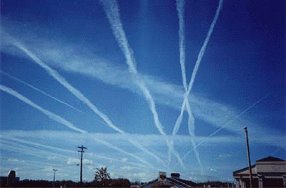
London's Mayor Livingstone is interviewed about Carbon Dieting -- including the taxation of plane trips enough to reduce traffic-- can Boeing react in time with a greener energy path for our planes here in Seattle?
Read on:
Plane SpeakingKen Livingstone, the mayor of London, is on a mission to tackle climate change - and that includes challenging the aviation industry head on, he tells John Vidal
Wednesday November 1, 2006
The Guardian
The mayor of London, Ken Livingstone, holds an energy saving lightbulb in his office at City Hall. Photograph: Martin Argles
Ken Livingstone, mayor of London, is these days possessed of one great idea. Climate change, and how to avert it, consumes him. It now informs all his decisions on transport. It is top of his agenda for social housing and new building developments. He reads about it in his spare time. He talks about it to anyone who will bend an ear and he will travel to the ends of the earth if necessary to cut deals with other politicians, to steal the best ideas from other cities and to communicate with anyone the urgency and scale of the problem.
Last week, Sir David Attenborough went to City Hall to talk to staff about the acceleration of change. When former US vice-president Al Gore's film on climate change, An Inconvenient Truth, was released, Livingstone hired a cinema and invited staff to watch it. He bought 20 copies of Jared Diamond's book on the ecological collapse of civilisation and gave them to colleagues; yesterday, the day after the Stern review warned of economic mayhem unless climate change is tackled, Livingstone signed up to Friends of the Earth's lobby for a law to reduce national emissions annually.
"In a practical sense, you can see climate change is now top of the London agenda and is being personally driven," says one of his colleagues, impressed at how Livingstone has linked the social and environmental agendas. "People used to see the congestion charge and public transport from the point of view of social inequality and the functioning of the city. They are all still core issues but they are not separate to climate change, they are integral to it now. He had to focus on things such as the public-private partnership [for the London Underground] in his first term. Now he has more time, the emphasis has changed. It helps having a strong Green contingent in the assembly, because there is very little disagreement."
Livingstone admits his position has changed, is changing, as information emerges. "I think what is happening is absolutely terrifying. When I first ran for mayor in 2000, the scientific consensus was that we would reach the climate change tipping point around the second half of the century. Depending on which scientific evidence you look at, it's down to between two and 10 years. There's no time for more studies or surveys.
"I just do not think that politicians understand the implications, which at the very extreme is the end of most large life forms. If we slip into irreversible climate change, it means hundreds of millions of people migrating and deaths. It means the poorest being hit the hardest."
As mayor, he has one arm tied behind his back, he says. If it were up to him, he says he would legislate against almost anything that adds to the problem. He would ban inefficient light bulbs, bang on carbon taxes, and massively increase the cost of air fares. "I think that every city is doing something quite well," he says. "We should take the best from around the world. We could take the plastic bag tax from Ireland, the packaging laws of Germany. We should put them together.
"But the one big thing that no one is tackling is aviation. Emissions are completely undermining the reductions achieved elsewhere," Livingstone says.
But there have been serious contradictions in his positions. His proposals for the London Plan, which will determine development in the city from 2008 onwards, says major airport expansion will be needed in the south-east "to meet London's economic needs". Is that not arguing that Londoners should be able to travel by air more? "I am no longer sanguine about that," he replies. "When we drafted the London Plan in 2002, we were nowhere near getting the alarming information that we are today. We have to address it. We are now preparing amendments to the plan against any further runway capacity in the south-east."
While Livingstone has no direct power over future developments at Gatwick or Stansted, observers say the significance of his withdrawal of support for the growth of these two airports - he has always been against the expansion of Heathrow - is that he is now challenging the aviation industry head on, as no other major politician has been prepared to do. His target is not business travellers, he says, who would need tickets to be massively more expensive to reduce the number of flights they take, but the frequent leisure fliers. "All tickets should reflect the impact of carbon emissions of that journey," he insists. "Instead of £12 or £15 for a ticket, it should be five or six times that. A lot of Labour party people say that the dramatic growth in air traffic is the poor getting on the plane for the first time, but it's not that at all. Half the population never gets on a plane. What's happening is that relatively few people, instead of going away once a year on holiday, are going three or four times a year to Barcelona or Prague or wherever. That's all very nice, but not at the cost of the continuation of life on planet Earth."
Targeting carbon polluters
What he can do, and intends to do more, is make it harder for carbon polluters in London and easier for people to cut back. Over the next year, Londoners will get a blizzard of new initiatives aimed at decentralising and reducing energy consumption. The city's new climate change agency has begun a commercial partnership with French energy giant EDF to roll out combined heat and power units across London; all new social housing developments will soon have to be nearly 60% more efficient than they are now; in 2008, he will introduce Britain's first low emission zone, which will ban heavy goods vehicles and cut emissions by 4% across much of central London. A new organisation will advise and oversee the greening of people's homes and lives. It will be easier for householders to install wind and photovoltaic energy systems; new congestion charges will be shortly announced that will pile more cost on to polluting cars. He is said to be delighted that Richmond council, in west London, is planning to increase parking charges for cars that are heavy polluters.
Just as US mayors and state governors have led federal government in setting targets and timetables for emission cuts, Livingstone sees one of his roles to pummel and lobby central government, and other authorities, to act. The governor of California, Arnold Schwarzenegger was heading for defeat, Livingstone says, before he grabbed the climate change agenda. Now he is leading the polls again.
London is the first city in Britain to set itself statutory carbon dioxide emission reduction targets. They are roughly on a par with the government's - 20% cuts by 2015, 60% by 2050. They are not as much as Livingstone would like, or thinks possible, but they are as far as he thinks they can be pushed for the time being. London's particular problem is that, unlike most local authorities, aviation represents 30% of the city's emissions. To get them down means he absolutely must tackle flying as well as transport and housing.
To do so, he has linked with leading green campaigners. Charles Secrett, former head of Friends of the Earth, advises him, and Greenpeace has worked with him on devising a plan to decentralise energy. "Livingstone understands the increased threats that climate change poses and the incredible opportunities it presents if we act fast enough," Secrett says. "He sees London's future being shaped by our response to climate change threats, and that if we decentralise energy and have non-polluting transport systems we can create jobs, have a better standard of living and show others a way forward in a climate-changed future."
Other EU cities are far ahead of London, Livingstone says, but he's chuffed at what's been done in just a few years. London is the only large city in the world, he says, that has achieved a major shift in transport from car to bus. All the predictions were that car use would increase, but traffic levels have been held for six years. Four years ago, 38% of people used their cars daily in London, it's now 19%; there has been a 72% increase in cycling over four years and there will be a 70% decrease in bus emissions as 500 buses are converted to run on hybrid electric-diesel motors; renewable targets for buildings are to be doubled; there are 20% more pedestrian crossings and 48% fewer people died on the roads last year compared with 2000; in a year the low-emission zone comes in, curtailing heavy lorries and coaches.
Meanwhile, Livingstone has been to the US to link with other world cities to share knowledge on reducing emissions, and to China to see the beginning of the world's first major eco-city. London will not get a Dongtang - a carbon neutral city for 800,000 people, powered by wind and sun - but a minuscule version of 200 carbon-neutral homes in Docklands. Every bit helps.
"That's the future," he says. "That's the way the market is going. London is going to grow by 100,000 people over the next 10 years and we don't want anything built that will add to the problem. My vision is of a city with a lot less carbon emissions, a lot more walking, more public transport, more bicycles. If you look around London, it's not a very attractive place to walk round."
But he is criticised, too. His backing of a controversial £450m motorway-scale bridge over the Thames in east London will increase traffic and emissions and - say Friends of the Earth, the Greens and locals - increase environmental injustice for some of the poorest communities.
Restraint on development
Livingstone fiercely defends the scheme, saying the green campaigners are "dangerously close" to proposing that poor people should be restrained from developing. "They have at present no option about where they cross. It's not unreasonable that they should have one bridge," he says.
The locals of Beckton, contemplating 20,000 cars an hour passing through their community, are not impressed. "He's talking rubbish," says one of the local organisers of the opposition to the bridge. "It's only for car drivers and just 25% of us near the bridge have cars."
Livingstone is on far safer ground with climate change. "I do not think there's the slightest doubt that we can get the emissions down," he insists. "In the areas I have power, a lot is being done. Individuals are already making decisions not to have that extra weekend in Barcelona or Prague. Nothing we are doing means that anyone's quality of life needs to change. It's not a massive change. It's just doing things differently."
Photo credit: from NASA off Google Images
 (Click on image to enlarge)
(Click on image to enlarge)  (Click on image to enlarge)
(Click on image to enlarge) 



